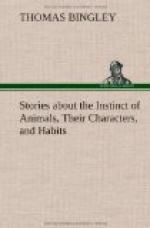“A person in the island of Ceylon, who lived near a place where elephants were daily led to water, and often sat at the door of his house, used occasionally to give one of these animals some fig leaves, a food to which elephants are very partial. Once he took it into his head to play one of the elephants a trick. He wrapped a stone round with fig leaves, and said to the carnac, ’This time I will give him a stone to eat, and see how it will agree with him.’ The carnac answered, ’that the elephant would not be such a fool as to swallow a stone.’ The man, however, reached the stone to the elephant, who, taking it with his trunk, immediately let it fall to the ground. ‘You see,’ said the keeper, ‘that I was right;’ and without further words, drove away his elephants. After they were watered, he was conducting them again to their stable. The man who had played the elephant the trick was still sitting at his door, when, before he was aware, the animal ran at him, threw his trunk around his body, and, dashing him to the ground, trampled him immediately to death.”
CHAPTER IV.
Uncle Thomas introduces
to the Notice of the Young Folks the
Ettrick Shepherd’s
Stories about Sheep; and tells them some
Interesting Stories
about the Goat, and its Peculiarities.
“I dare say, Boys, you have not forgotten the Ettrick Shepherd’s wonderful stories about his dogs. Some of those which he relates about sheep are equally remarkable, and as he tells them in the same pleasing style, I think I cannot do better than read to you the chapter in ’The Shepherd’s Calendar’ which he devotes to this animal.”
“Thank you, Uncle Thomas. We remember very well his stories about Sirrah and Hector and Chieftain, and the old Shepherd’s grief at parting with his dog.”
“That’s right, Boys; I am pleased to think that you do not forget what I tell you. But listen to the Ettrick Shepherd.”
“The sheep has scarcely any marked character save that of natural affection, of which it possesses a very great share. It is otherwise a stupid indifferent animal, having few wants, and fewer expedients. The old black-faced, or forest breed, have far more powerful capabilities than any of the finer breeds that have been introduced into Scotland, and, therefore, the few anecdotes that I have to relate shall be confined to them.
“So strong is the attachment of the sheep to the place where they have been bred, that I have heard of their returning from Yorkshire to the Highlands. I was always somewhat inclined to suspect that they might have been lost by the way, but it is certain, however, that when once one or a few sheep get away from the rest of their acquaintances, they return homeward with great eagerness and perseverance. I have lived beside a drove-road the better part of my life, and many stragglers have I seen bending their steps northward in the spring of the year. A shepherd rarely sees these journeyers twice; if he sees them, and stops them in the morning, they are gone long before night; and if he sees them at night they will be gone many miles before morning. This strong attachment to the place of their nativity is much more predominant in our old aboriginal breed than in any of the other kinds with which I am acquainted.




